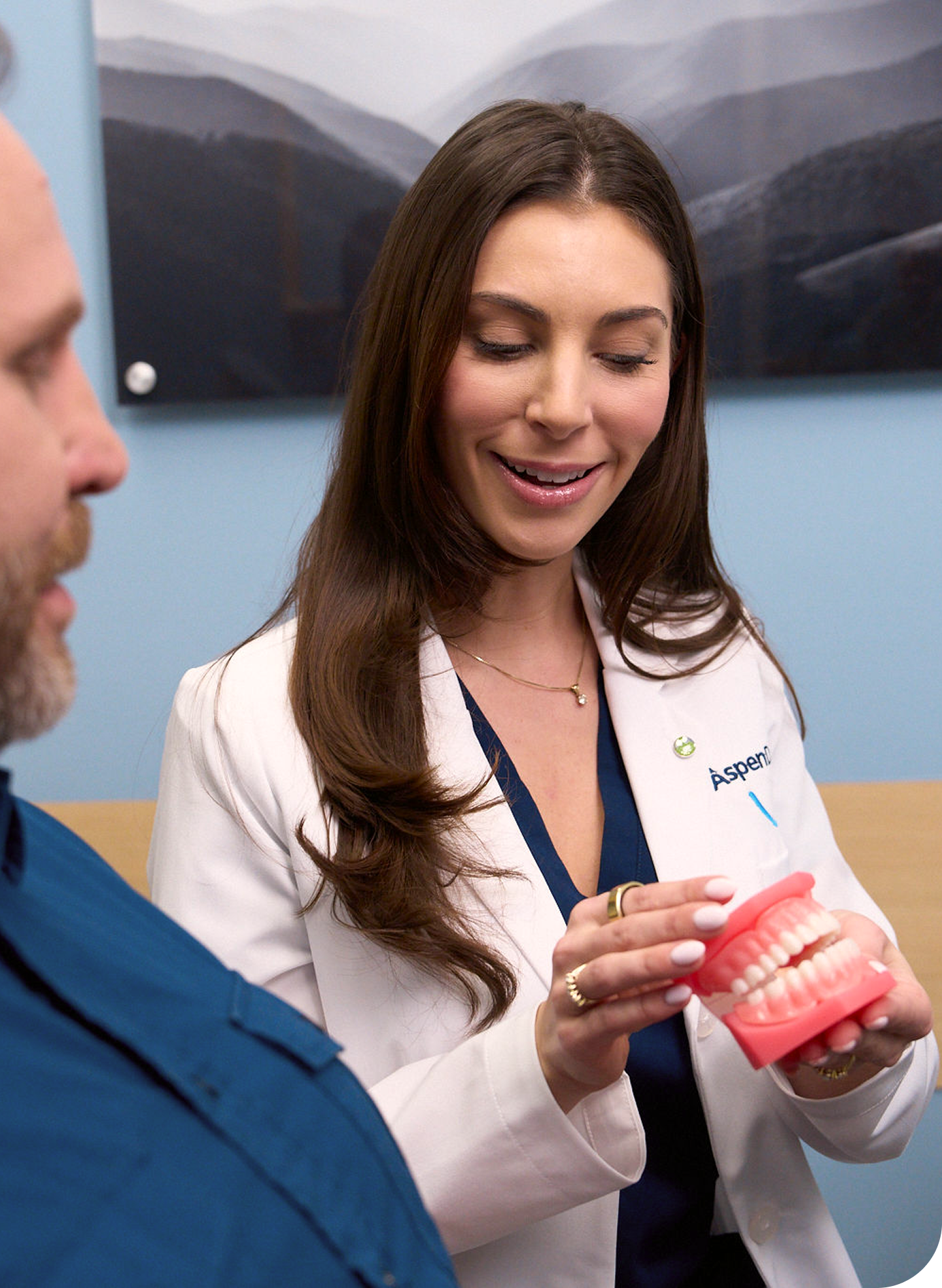Last updated 03.25.2025
Denture stomatitis: causes, treatment and prevention
Understand denture stomatitis—its causes, symptoms, and how to prevent it for your healthiest smile.

If you’re struggling with redness or discomfort under your dentures, you could be dealing with denture stomatitis. It’s a common, but often overlooked, fungal infection. But the good news is that it’s treatable and even preventable.
If you’re experiencing symptoms or simply want to learn more about this condition, read on to learn tips to keep your smile healthy and your dentures in top condition in this quick guide.
If you think you might have denture stomatitis or just want to learn more, schedule an appointment at Aspen Dental today.

What is a denture stomatitis?
Denture stomatitis, also known as oral thrush, is a yeast infection in the mouth caused by a fungus called Candida. It can happen to people who wear dentures, but it can also affect others. While it can be uncomfortable, it’s not contagious and is usually easy to treat.
Denture stomatitis is categorized into 3 types based on how severe it is:

Newton Type 1: The mildest form, showing small, localized red areas in the mouth.
Newton Type 2: More advanced, with widespread redness covering larger areas under the dentures.
Newton Type 3: The most severe, often resulting in a granular, inflamed texture in the affected areas.
This classification helps your dentist choose the right treatment based on how far the condition has progressed.
If you’re experiencing discomfort or redness in your mouth, schedule an appointment with your dentist at Aspen Dental as soon as possible or walk-in that same day.

9 common causes of denture stomatitis
Denture stomatitis often comes down to lifestyle or hygiene habits. Here are some of the most common reasons why it can happen:
Not keeping up with oral hygiene
Having a dry mouth
Lacking certain nutrients or vitamins
Smoking
Wearing dentures while you sleep
Dentures that don’t fit properly
Health conditions like diabetes
Using antibiotics for a long time
A weakened immune system
Symptoms of denture stomatitis
Denture stomatitis can show up in different ways, from subtle changes to more noticeable symptoms. Some common signs to look out for are:

Sores and cracked skin
You might notice dry, cracked skin in the corners of your mouth. In more serious cases, canker sores could also appear.
Pain
This condition can cause discomfort and inflammation, especially when swallowing. That’s because it often leaves your mouth feeling dry and swollen.
Swelling
Bacteria and yeast can build up under poorly fitting dentures, leading to unpleasant odors and bad breath.
Bad breath
It’s common to experience swelling, along with tenderness and redness underneath the dentures. If it gets worse, the swelling could eventually lead to bleeding.
Red or white patches on the tongue or inside the mouth
Red or white patches might pop up on your tongue, gums, inner cheeks, lips or the roof of your mouth. These patches are a common sign of denture stomatitis.
Dentures that don’t fit quite right
If your dentures suddenly don’t fit as well as they used to, it could be due to the ongoing inflammation and soreness caused by stomatitis.

What are my treatment options?
Treating this infection depends on how serious the condition is. Common treatments include antifungal medications, lozenges, laser therapy or even taking your dentures out for a while.
In some cases, oral surgery may be advised, however, if you’re worried about denture stomatitis, schedule an appointment at Aspen Dental today.
How can I prevent denture stomatitis
Here are 3 simple tips to help reduce the risk of denture stomatitis:
Avoid smoking and vaping
Smoking and vaping can irritate your mouth, weaken your immune system, and make infections more likely. If you smoke or vape, try to quit if you can.
Proper care and cleaning of dentures
Clean your dentures every day with a soft-bristled toothbrush to remove food particles and plaque that can trap yeast and bacteria. Make sure to soak your dentures in a denture cleaner overnight to keep them fresh and clean. Don’t ever sleep with your dentures in overnight, as this could lead to exacerbate the infection.
Routine dental check-ups
Seeing your dentist regularly is key to staying on top of your oral health. Your Aspen Dental care team can catch any issues early on, like denture stomatitis, saving you from bigger problems down the road.

Denture stomatitis FAQs
What is the most common cause of denture stomatitis?
Denture stomatitis is often caused by a buildup of Candida, a fungus naturally found in the mouth. This usually happens due to poorly fitting dentures, not keeping up with good oral hygiene or sleeping with dentures in.
What are the types of denture stomatitis?
There are three types: Newton Type 1, Newton Type 2, and Newton Type 3. Newton Type 1 is the mildest form, while Newton Type 3 is the most severe.
What happens if denture stomatitis is left untreated?
If it’s not treated, denture stomatitis can lead to ongoing soreness and irritation in the mouth. It may also cause discomfort, cause bad breath and make your dentures fit poorly.
What is the best treatment for denture stomatitis?
Treatment depends on how severe the condition is and the individual’s oral health. Common options include antifungal medications, lozenges and even laser therapy. Your Aspen Dental care team can recommend the best solution for you.
Prevent denture stomatitis today
While denture stomatitis is a common and uncomfortable oral condition, it’s easily treatable and preventable with the right care. If you notice pain, sores, cracked skin or other symptoms, don’t wait to schedule an appointment at Aspen Dental today.



